October 1, 2022 - No. 22
October 2 General Election in Brazil
People's Forces Unite in Action to
Take Back Their Country, Affirm Rights
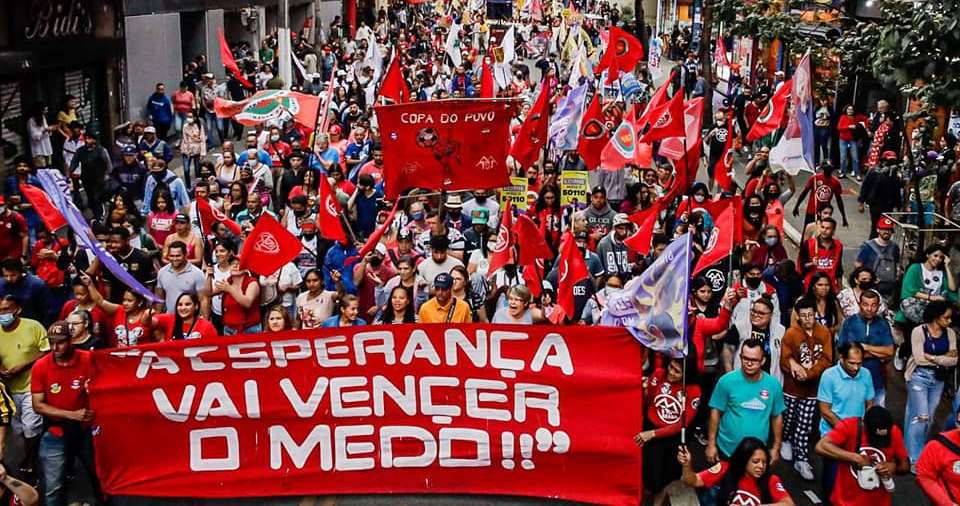
Banner "Hope Will Conquer Fear" in São Paulo, Brazil, demonstration, September 10,
2022.
• Brazilians Go All Out to Defend Their Rights Against Counterrevolutionary Offensive
• Faced with Probable Defeat, Extreme Right Threatens Democracy
Cuba
• Cuban People Ratify New Family Law
in Historic Referendum
Trinidad and Tobago
• 46 Years of Republicanism: Constitution Matters
October 2 General Election in Brazil
People's Forces
Unite in Action to Take Back
Their Country, Affirm Rights
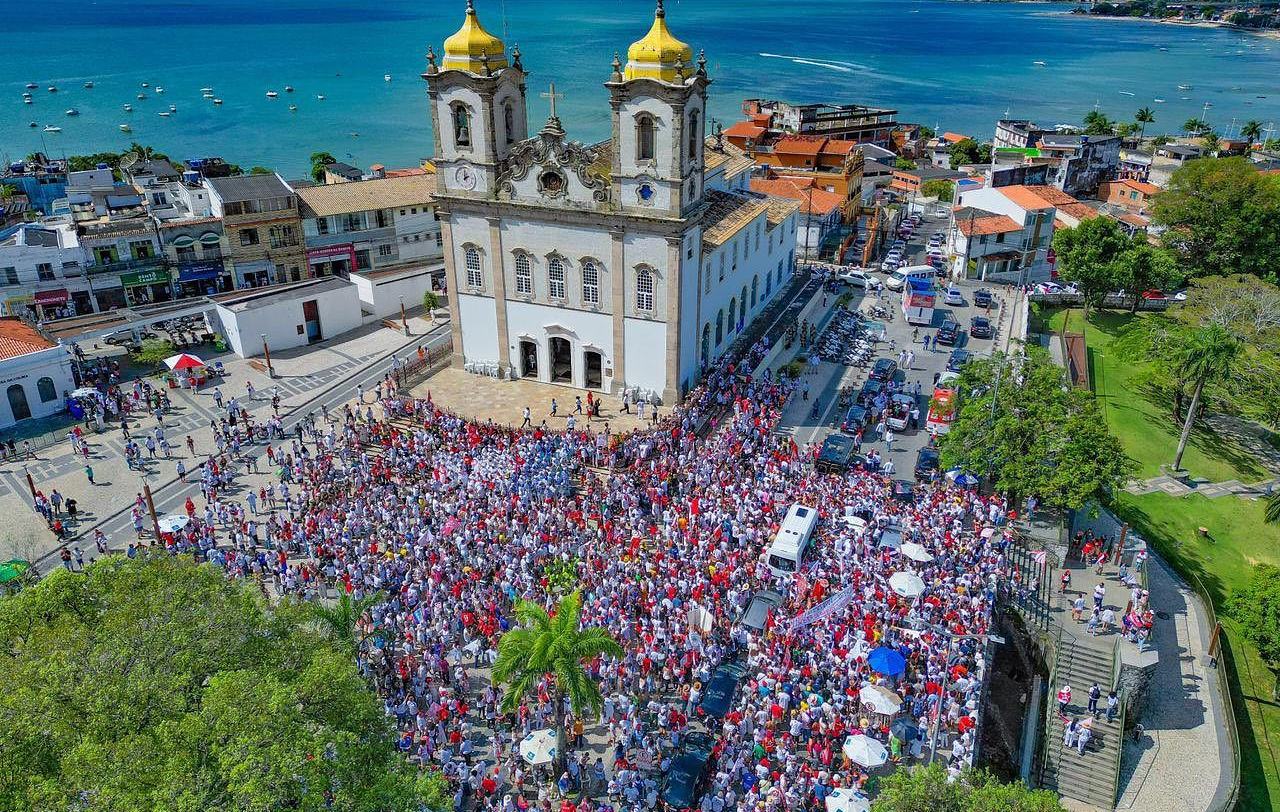
Election rally in support of Lula in Salvador, Brazil, September 30, 2022.
There is much at stake for the people of Brazil and the region in the general election taking place on October 2. Brazil is a resource-rich country with the second largest population and third largest land mass in the Americas. It has the biggest economy in Latin America and is a member, along with China, Russia, India and South Africa, of BRICS. There are 156 million eligible voters who can vote for the president, over 600,000 of them living abroad. Voting is compulsory for Brazilian citizens between 18 and 70 years of age who are literate. Others, including 16 and 17 year-olds, can vote voluntarily.
The elections are for the president of the republic, all 513 members of the Chamber of Deputies and one third of the 81 members of the Senate (which together constitute the National Congress), along with the governors of Brazil's 26 states and the federal district and the members of state legislatures and municipal councils.
Although there are 11 presidential candidates, the two main contenders are the current president Jair Bolsonaro who is seeking a second consecutive term, and Luiz Inácio Lula da Silva (Lula), a popular two-term president (2003-2010) and former union leader. Bolsonaro is the candidate of a three-party coalition, For the Good of Brazil. His vice presidential running mate is a retired army general, while he himself is a former army captain, indicative of the military's prominent role in his coming to power and his government. Lula, leader of the Workers' Party (PT) and former leader of the Metalworkers' Union, is the candidate for the Let's Go Together for Brazil coalition. What began in April as an alliance of the PT, the Communist Party of Brazil (PCdoB) and the Green Party, known as the Brazil of Hope Federation, has since been joined by seven other parties in a ten-party coalition for the election. Lula's running mate is a prominent member of the Socialist Party and a former governor of São Paulo. If no candidate achieves at least 50 per cent of the vote plus one on October 2, the two candidates with the highest number of votes will go to a second round on October 30.
Bolsonaro's campaign basically rests on his record to date and continuing down the same road of neo-liberal nation-wrecking and taking no social responsibility for the lives and well-being of the Brazilian people. The tragic and unforgivable consequences of this were on full display during the pandemic.
Lula's platform revolves around rebuilding the country after six years of the anti-social offensive launched after President Dilma Rousseff, of the PT, was removed in a coup in 2016 to placate the international financial oligarchy. After that the coup forces took aim at Lula to prevent the people's forces from returning him and a PT government to office in 2018, so the wrecking could continue. The program for rebuilding Brazil that Lula is running on today calls for investing in social programs, combating inflation by controlling prices, protecting the environment and defending Brazil's sovereignty.
Bitter Experience of 2018 Election
In the last election, as in the current one, Lula consistently led all the voter intention polls. This was in spite of his being in prison and having to fight one legal battle after another to defend himself against trumped-up corruption charges aimed at destroying his reputation and taking him out of the running for a third term as president. The operation mounted against him involved persecution in the media and by politicized judicial actors on a mission to have him convicted, jailed and disqualified as a candidate -- without evidence and in violation of his right to due process and the presumption of innocence.
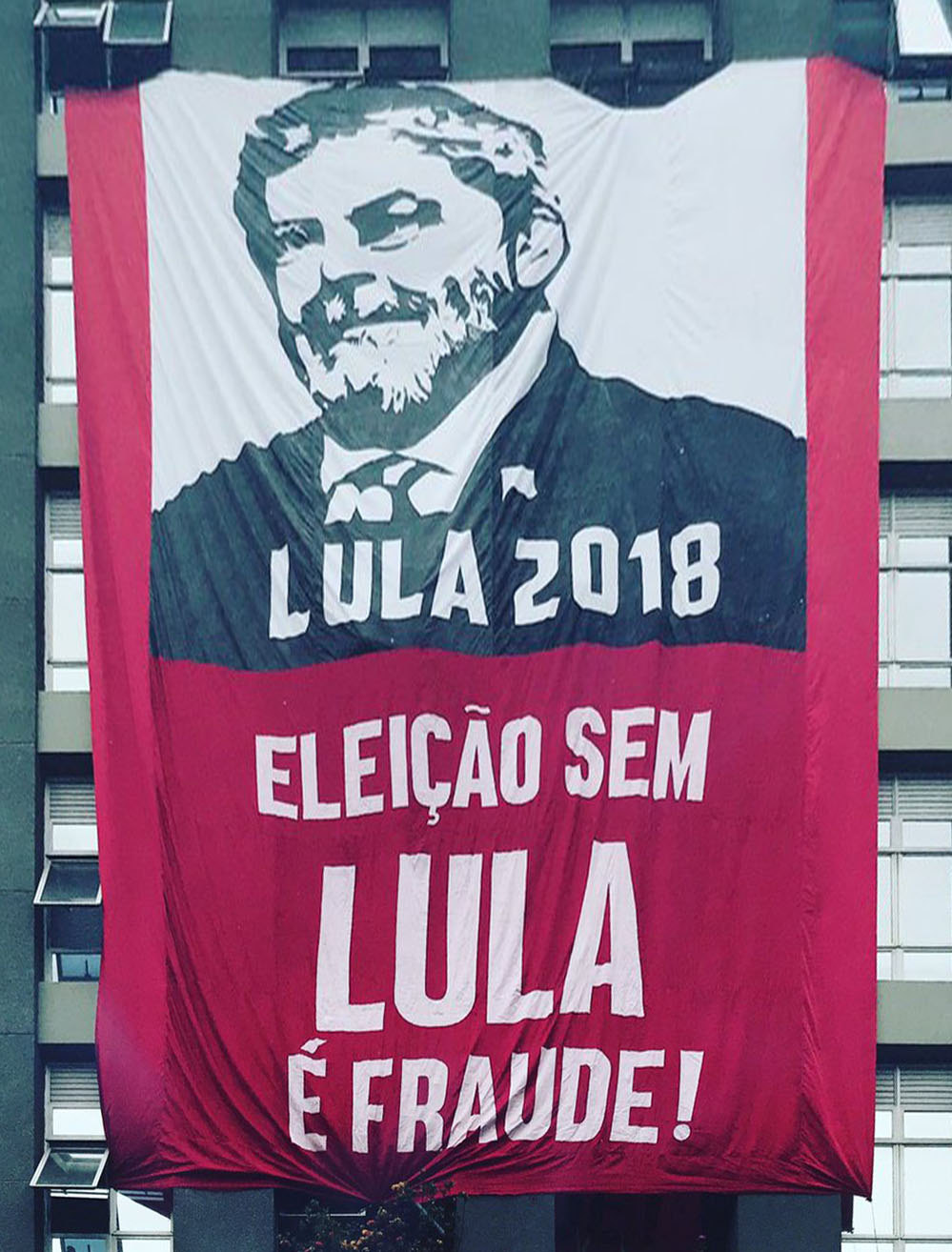 The
Armed Forces were also mobilized to play a role. The Chief of Staff of
the Army issued a thinly veiled threat via Twitter to the justices of
the Supreme Court, that the Army would "reject impunity" should the
court not deny Lula's bid to remain out of jail. Lula had made it clear
he would continue to fight as long as there were still avenues open for
him to appeal the harsh prison sentence handed to him by the architect
of the judicial war ("lawfare") being waged against him.
The
Armed Forces were also mobilized to play a role. The Chief of Staff of
the Army issued a thinly veiled threat via Twitter to the justices of
the Supreme Court, that the Army would "reject impunity" should the
court not deny Lula's bid to remain out of jail. Lula had made it clear
he would continue to fight as long as there were still avenues open for
him to appeal the harsh prison sentence handed to him by the architect
of the judicial war ("lawfare") being waged against him.
It is worth recalling that following a U.S.-supported coup in 1964
the Brazilian people suffered through 21 years of bloody military rule
that only ended in 1985.
The Supreme Court justices seemed to
get the Army's threat that it would "reject impunity" and voted by the
narrowest of margins to lock Lula up to begin serving an unjust 12-year
sentence. The disqualification of his candidacy came a few months later
when the campaign was in full swing, necessitating a last minute change
in candidates and ultimately costing the PT and its allies the
presidency they had been on track to win.
Last year, with Bolsonaro in the presidency and Lula out of jail with his convictions all on the way to being quashed (all have since been annulled), the Army chief who tweeted the threat to the Supreme Court confirmed that it did not come from him as an individual but from the Armed Forces as a whole. He also let it be known that at the time, the business and banking communities were demanding a military intervention.
Given this sordid history, the people's forces are taking nothing for granted today, even the possibility that based on the false claims Bolsonaro has repeated about the voting system being "insecure" and his suggestion that he might not accept the results if they are not "clean," he and his supporters, with many members of the police and military among them, might try to stage a Trump-style violent self-coup attempt to hold onto power. Whether or not that actually happens the people's forces have gained a lot of experience over the years through the fights they have had to wage against the forces of reaction that have interfered to prevent them from electing leaders and governments of their choosing, and they are in action to make sure that does not happen in this election like it did in the last one.
Voting System Is Secure, Abuse of Power Is the Problem
To refute the false claims floated by Bolsonaro about the unreliability of Brazil's voting system as a possible prelude to his crying "fraud" if he does not win, the PT recently held a video conference to inform its members abroad as well as political parties with which it has friendly relations about Brazil's electoral process. CPC(M-L) was among the 61 parties from 41 countries represented at the conference.
Gleisi Hoffman, National President of the PT, acknowledged that support from party activists living abroad and others who have for years stood with the Brazilian people in their fight to defend their democratic rights played an important role in the fight to free Lula and in opposing "the replacement of politics by hate" that helped raise Bolsonaro to power in 2018. Bolsonaro is a figurehead of the right-wing fundamentalist movement worldwide, she said, and holds a lot of power in it. She also said that his supporters have made many attempts to provoke the PT using violence, the most serious being the killing of two PT members, one the party's national treasurer, this summer. So they are being vigilant and careful not to get provoked and dragged into violent confrontations.
Some aspects of Brazil's electoral process emphasized in the presentation included:
- The security, efficiency and transparency of its fully digitized, auditable voting system which is among the most modern and sophisticated in the world. Voter fraud is not, and has not been a problem since the institution of electronic voting in Brazil over 20 years ago. It was a problem in the past when voting was done by marking paper ballots and depositing them in a box. Sometimes boxes would arrive at voting stations pre-filled with marked ballots.
- The abuse of power is a big concern. Over the last few months Bolsonaro has been handing out large amounts of public funds in so-called emergency aid to Brazilians and paying some parliamentarians from a secret parallel budget to buy their loyalty. He also turned a state celebration of the September 7 bicentenary of Brazil's independence from Portugal into a campaign rally, using public funds and the army for that purpose. After a complaint was submitted to the High Electoral Court it issued an order forbidding the use of any images or videos from that event in his election campaign. More recently, however, he did the same thing on the world stage, using the United Nations General Assembly as a platform to campaign for his re-election. The video of his shameless performance in which he told lies and attacked his opponent Lula in all but name remains available for viewing and listening to in seven languages on the UN’s website.
- Fake news and disinformation disseminated on a mass scale to manipulate the vote, as took place in 2018, has been addressed by the electoral law. The High Electoral Court which administers and monitors elections has solicited the assistance of major social media companies in detecting and countering activity prohibited by the electoral law and violations of their own policies on their platforms.
- Rules have been introduced since the last election to control use of the internet, social media and messaging platforms for campaigning. For example, no paid election ads can be carried on the internet, and mass messaging over any platform is only permitted for those who register voluntarily to receive such messages.
- For the first time official international observer missions along with a group of national observers will be present during the election. The PT is also preparing to welcome guests from other countries as it has in the past to accompany and monitor the election. They will be free to visit voting centres, ask questions, talk to voters, the press and others.
Asked what would happen should Bolsonaro claim the voting was not "clean" or transparent and refuse to accept the results, for which he has already tried to create public opinion, one of the speakers emphasized that Brazilians can be trusted to protect their democracy and institutions because they do not want to see their elections marred by fraud or violence. It is important that everyone understands the rules and the process so they can help protect the integrity of the election and so there can be a democratic transition of power, they said. Furthermore the PT, along with its allies and supporters in Brazil and abroad, have been mobilizing and denouncing the attacks on democracy since the coup against Dilma Rousseff in 2016 and are working now to keep everyone informed, so if Bolsonaro tries something it will not succeed.
The Canadian people and others the world over stand with the Brazilian people in the battle they are waging to assert and protect their democratic rights in the election and beyond as they fight for their own empowerment, the necessary condition for putting an end to the usurpation and abuse of power that is inherent to liberal democracy, an outmoded system of governance devised precisely to keep the people out of power.
No to Coups! No to Lawfare!
The Brazilian People Must Decide!
(With files from Brasilwire. Photos: PT, Media Ninja)
Brazilians Go All Out to Defend Their Rights Against Counterrevolutionary Offensive
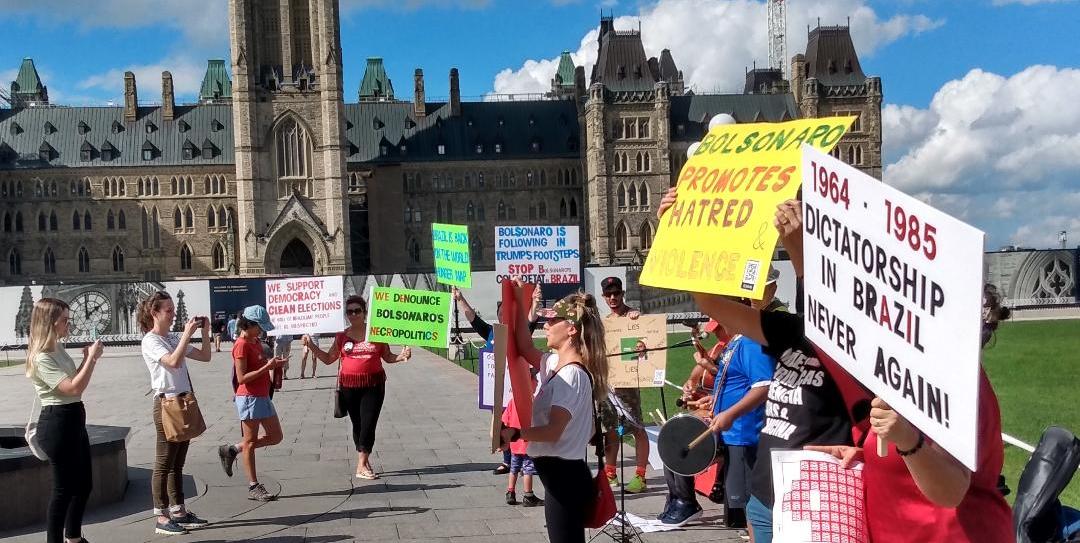 Action
by the Brazilian community in Ottawa to demand that the October 2
elections in Brazil be peaceful and that their results be respected
Action
by the Brazilian community in Ottawa to demand that the October 2
elections in Brazil be peaceful and that their results be respected
People from the Brazilian community and friends and allies gathered on Parliament Hill on the afternoon of September 10 to express their support for Luiz Inácio "Lula" da Silva to be elected next president of Brazil and express their concern about the calls of President Jair Bolsonaro to reject the results of the elections à la Donald Trump if they do not suit him and Lula wins.
This violence is already wielded against the people, as reflected in
the political assassination in 2018 of Marielle Franco, who at the time
was city councillor for Rio de Janeiro. It is reflected as well in an
atmosphere of death threats against political opponents of Bolsonaro,
in the presence
of paramilitaries, police and the military itself in the countryside as
well as in the fact that open season has been declared on Indigenous
land defenders. The latter are being targetted for death by the
Bolsonaro government and are attacked and killed for defending their
river and the still-standing forest.
The calls put forward by the demonstrators were for the protection of the Amazon rainforest in defence of Indigenous rights and the reestablishment of public sectors which were privatized under Bolsonaro.
In 2021, 40 per cent of all native forest loss in the world occurred in Brazil. Under Bolsonaro, the Brazilian Amazon has lost an area of forest larger than Belgium. It is the highest deforestation rate ever recorded.
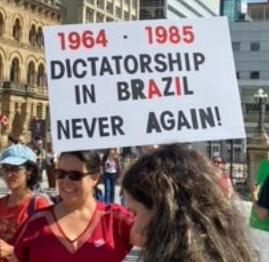 For
its part, Lula's government, from 2003 to 2010, adopted policies that
slowed the rate of tropical forest loss. Deforestation declined by 82
per cent, from 27,772 to 4,571 square kilometres between 2004 and 2012,
when Lula's successor and ally Dilma Rousseff was in power. The 2012
figure was the lowest rate recorded since satellite monitoring began in
1988.
For
its part, Lula's government, from 2003 to 2010, adopted policies that
slowed the rate of tropical forest loss. Deforestation declined by 82
per cent, from 27,772 to 4,571 square kilometres between 2004 and 2012,
when Lula's successor and ally Dilma Rousseff was in power. The 2012
figure was the lowest rate recorded since satellite monitoring began in
1988.
From August 2021 to July 2022, on the other hand, 10,781 square kilometres of rainforest were cut down, an area the size of the U.S. state of Massachusetts. The current deforestation rate is pushing the Amazon to what scientists call a "point of no return," beyond which the rainforest won't be able to recover on its own and will turn into a dry savanna, in the process emitting more planet-warming greenhouse gases than it absorbs.[1] This scenario is already happening in heavily deforested parts of the Brazilian Amazon.[2] Brazil holds 60 per cent of the Amazon, and 21 per cent of the Brazilian portion is already gone, an area three times greater than the United Kingdom.[3]
The main drivers of this deforestation are oligarchic livestock ranchers, loggers, illegal miners and land grabbers, who have acted largely with impunity and with the aid of the Bolsonaro government which is still supporting bills in Congress which weaken environmental licensing, open Indigenous lands to mining, oil exploration and agribusiness, allow greater unregulated use of pesticides, and legalize land grabbing in the Amazon.
The Articulation of the Indigenous Peoples of Brazil (APIB), a group representing 300 Indigenous communities within Brazil, has requested that the International Criminal Court (ICC) try Bolsonaro for crimes against humanity, genocide and ecocide. They are in action to defend their hereditary rights and consider the legalization of environmental destruction as dangerous not only for Brazil, but for the entire planet.

Fires burning in the Amazon, Sepember 2022.
In the remaining months of his current term, Bolsonaro is doing his best to strip away Indigenous rights enshrined in Brazil's 1988 constitution, in league with agribusiness and mining interests. New bills seek to erase the process for defining and protecting Indigenous lands, legalize already operating illegal mining and open the door for new mining, power plants and massive agriculture projects. They allow these to proceed without the consent of affected communities in violation of protections mandated by the UN Declaration on the Rights of Indigenous Peoples.
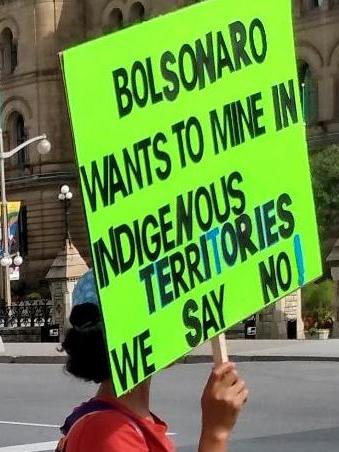 One of Lula's strategies from 2003 to 2008 was the creation of new
protected areas and Indigenous lands. His administration approved a
total of 268,000 square kilometres of protected
areas and 88 Indigenous territories. Today, part of Lula's political
program is to eject
illegal miners from the Amazon and fight the criminal networks wreaking
destruction in the rainforest, to rebuild IBAMA, the federal
environmental protection agency, to create a new ministry for
Indigenous peoples, as well as to make the climate crisis an absolute
priority.
One of Lula's strategies from 2003 to 2008 was the creation of new
protected areas and Indigenous lands. His administration approved a
total of 268,000 square kilometres of protected
areas and 88 Indigenous territories. Today, part of Lula's political
program is to eject
illegal miners from the Amazon and fight the criminal networks wreaking
destruction in the rainforest, to rebuild IBAMA, the federal
environmental protection agency, to create a new ministry for
Indigenous peoples, as well as to make the climate crisis an absolute
priority.
Another matter of concern, one which directly involves Quebec and Canada, is the privatization of many public enterprises under Bolsonaro, including the public water utility CESAE, which supplies 30 municipalities with a population of 13 million people in the State of Rio de Janeiro. This is being challenged, not only by Brazilian labour unions and human rights groups as being in violation of national laws, but also by the Legislative Assembly of the State of Rio de Janeiro itself, which voted to stop the auction. This decision was overruled by decree and ordered to continue by the Interim governor, a Bolsonaro ally. The two main investors in this privatization are the Canada Pension Plan Investment Board (CPPIB) and Alberta's pension fund investor AIMCo. The CPPIB also plans to take advantage of Bolsonaro’s sell-off of Brazil’s largest publicly-controlled energy utility Electrobras, which Lula has promised to cancel or reverse.
Quebec's Caisse de Dépôt et de Placement (CDPQ) has major investments in Brazil. It has invested in Terna Group, specialized in energy transportation, as well as in Telefonica, a Spanish telecommunications multinational. In 2019, the CDPQ invested in Transportadora Associada de Gas (TAG), the biggest gas transportation company in Brazil. In this, it is in partnership with ENGIE, a major independent producer of electricity in Brazil. The CDPQ, through its real estate subsidiary Ivanhoé Cambridge, has invested in infrastructure in Brazil such as the 2016 Olympics and the 2014 Soccer World Cup. The CDPQ has an office in Sao Paulo as well as in Mexico.
Notes
1. See "When will the Amazon hit a tipping point?," Nature, February 25, 2020.
2. "Brazil's Amazon is now a carbon source, unprecedented study reveals," Mongabay, July 14, 2021.
(New agencies and support groups. Photos: TML, Ottawa-Brazil Solidarity, Media Ninja)
Faced with Probable Defeat, Extreme Right Threatens Democracy
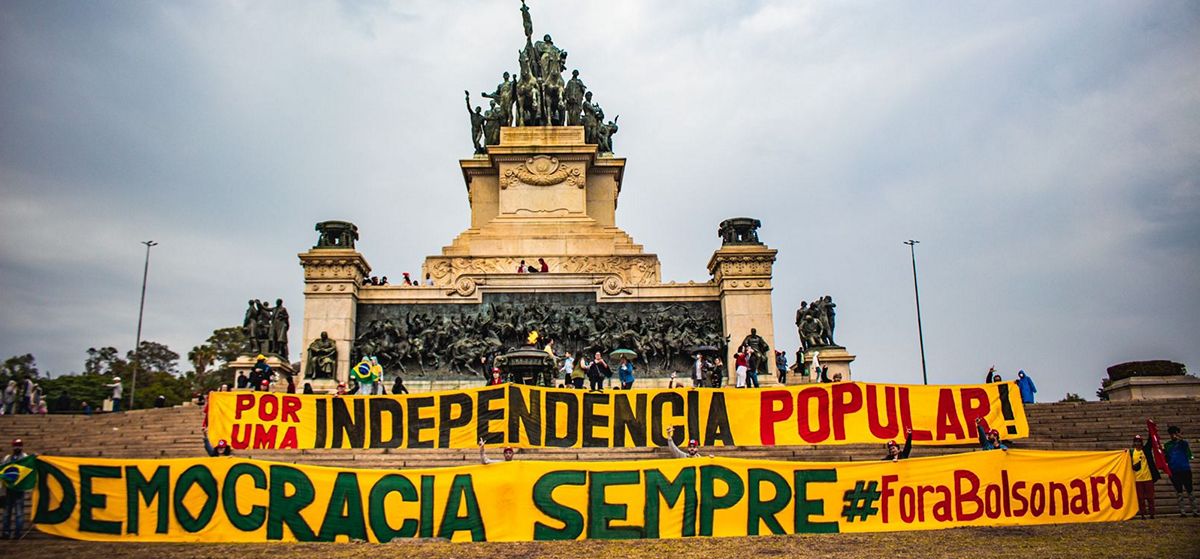
Action by Brazilian youth on 200th anniversary of independence, September 7, 2022.
On September 7th of this year, Brazil celebrated the bicentennial of its independence and nine days from now we will be entering another chapter in this long battle of the Brazilian people in defence of democracy, social justice and national sovereignty. It is imperative to defeat the extreme right-wing government of Jair Bolsonaro, an anti-people, pro-imperialist government of national betrayal, with neo-fascist characteristics.
Defeating Bolsonaro is the main objective of the Communist Party of Brazil (PCdoB) in the October presidential election and an integral part of the Brazilian people's journey toward full independence.
It was precisely in the interest of democracy and national sovereignty that the PCdoB advocated the formation of a broad front capable of defeating the extreme right.
The PCdoB's political proposal was the one that prevailed during the development of the political alliance, with Lula for president and Geraldo Alckmin for vice-president. The latter is a figure from the so-called democratic centre with a long history in the conservative camp, who recently joined the Brazilian Socialist Party (PSB), a centre-left party.
The development of the Lula-Alckmin alliance is a visible manifestation of the Broad Front advocated by the PCdoB, which with the PT [Workers' Party] and the Green Party form the Brazil of Hope Federation.
Hence, maintaining its autonomy and its own program, the PCdoB is participating in the election as part of this progressive federation, an arrangement created by the political initiative of communists. This is not only an innovation in Brazil, but a democratic advance.
Regarding the presidential election, all polls suggest Lula is favoured to win. Some polls suggest he could even win in the first round, which would mean receiving more than 50 per cent of the valid votes.
Bolsonaro has been doing and is still doing everything he can to try and regain some of his popularity. He has resorted to self-serving measures, such as temporarily increasing benefits for the poor until December, using powerful tools to spread fake news through social media, and attempting to manipulate to his advantage the religious sentiments of the Brazilian people, making use of unscrupulous neo-Pentecostal pastors. These and other strategies have not significantly increased his ratings nor reduced his rejection in the polls.
On the other hand, Lula has continuously expanded his political support.
Bolsonaro, facing probable defeat, continues with his fierce anti-communist discourse and threats to the electoral process.
Paving the way for the same script adopted by Donald Trump, Bolsonaro is trying to involve the Armed Forces in the aberrant and unconstitutional role of overseeing the elections and announcing that he will win in the first round of the election. However this is the opposite of what all polls conducted so far suggest, since they point to Lula having a real chance of winning in the first round. Once the voting is over and Lula's victory is confirmed, Bolsonaro could expand his false discourse of a "rigged election" as a last, desperate attempt to stay in power.
In light of this, we invite friendly parties to strengthen international solidarity with the Brazilian people and with Lula's candidacy, a crucial factor in guaranteeing respect for the electoral outcome, whether in the first round on October 2 or in the second round on October 30.
Lula's election will make it possible for Brazil to return to social inclusion, respect for human rights and the defence of multipolarity and the cooperative integration of Latin America and the Caribbean.
For a Stronger and More Influential PCdoB in the
Institutional Life of the Country
As for the specific goals of the Party, we intend to at least re-elect our eight federal deputies. In addition, there is a real chance that we will expand these numbers by electing vice-governors and perhaps a senator.
For the information of sister parties:
- The PCdoB is fielding a total of 218 candidates in all the states of the Federation.
- There are 66 candidates for federal deputy (47 per cent women).
- There are 144 candidates for state representative (40.27 per cent women).
- There are three candidates for vice-governor — in the Federal District, Pernambuco, and Tocantins (all of them women).
- There is one candidate for the Senate for Goiás, as well as two candidates for the first substitute for the Senate and another two for the second substitute for the Senate -- five in total (all women).
Certain that we can rely on the solidarity and support of communists and progressives from all over the world, we emphasize our commitment to strengthening the internationalist ties of the PCdoB with friendly organizations that fight for a world of peace and justice, on the road to socialism.
(Brasilia, September 23, 2022. Slightly edited for grammar and clarity by TML. Photo: Brazil de Fato)
Cuba
Cuban
People Ratify New Family Law
in Historic Referendum
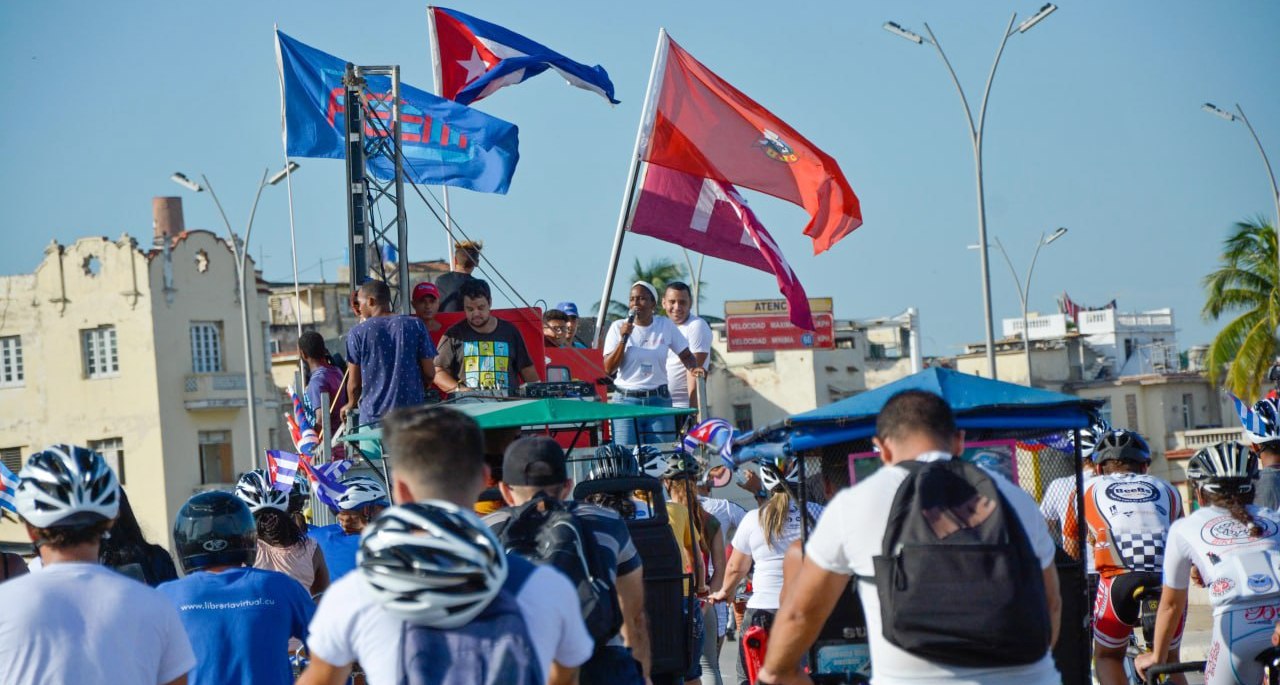 Cuban youth mobilizing for the success of the referendum on the Family Code, September 17, 2022.
Cuban youth mobilizing for the success of the referendum on the Family Code, September 17, 2022.
On September 25, a new Family Code was approved in Cuba by a national referendum in which more than six million people participated, representing 74 per cent of eligible voters. The Code, which addresses a wide range of relationships and circumstances that pertain to families and family life, reforming and expanding the family law in force since 1975, received an approval of 66.87 per cent. It was signed into law on September 26 by the President of the National Assembly of People's Power Esteban Lazo and the President of Cuba Miguel Díaz-Canel and is now in force.
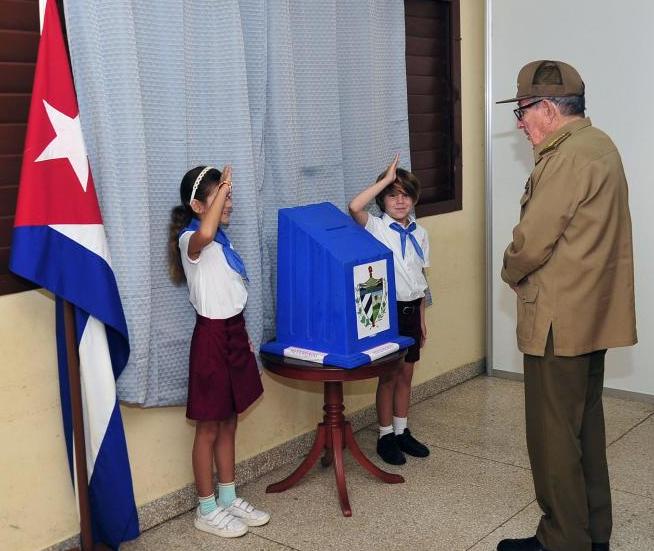 While Cuba's 2019 and 2010 Constitutions were both ratified by the
Cuban people through referendums, this is the first time a law has been
submitted to a popular and binding referendum in Cuba. It is also
history-making on a world scale for being the first time a Family Code
has been adopted by a
direct, secret vote of a country's citizens.
While Cuba's 2019 and 2010 Constitutions were both ratified by the
Cuban people through referendums, this is the first time a law has been
submitted to a popular and binding referendum in Cuba. It is also
history-making on a world scale for being the first time a Family Code
has been adopted by a
direct, secret vote of a country's citizens.
The norms contained in the Code are governed by the principles, values and rules contained in Cuba's constitution as well as international treaties and conventions in force in Cuba such as the UN Conventions on the Rights of the Child and of Disabled Persons, among others. In the process of crafting the new Code, the actual lived experiences and stories of the Cuban people were taken into account, and the family law of other countries was studied.
Cuba's President Miguel Díaz-Canel has referred to the final version of the new law as "fair, necessary, updated, and modern" in that it accords rights and guarantees to all people and to the diversity of today's families.
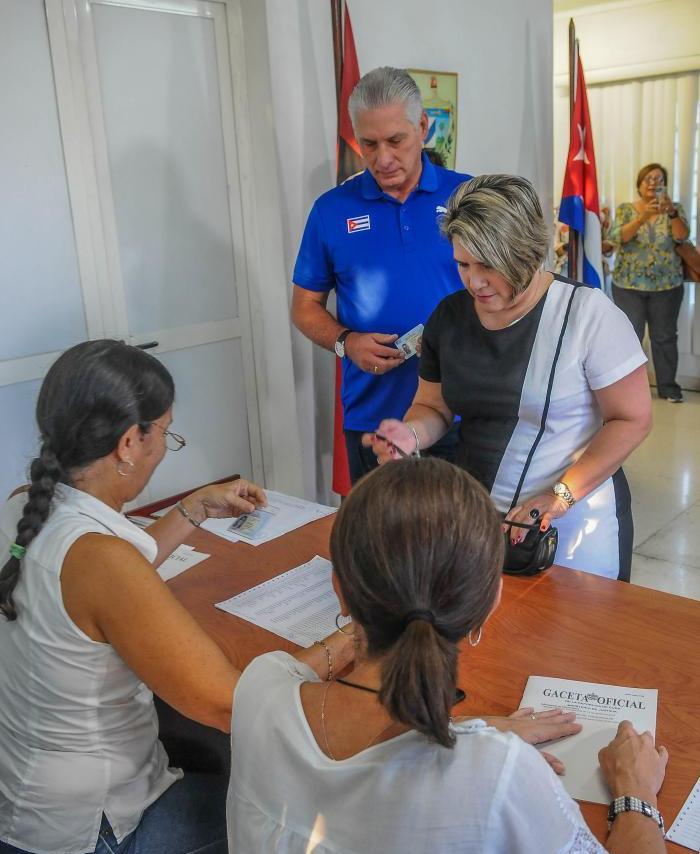 The new Code is based on the recognition of the equality of all
people before the law enshrined in Cuba's constitution, entitling
everyone to the same protection in the enjoyment of rights, freedoms
and opportunities, without any discrimination due to any personal
condition or circumstance that
implies a distinction harmful to human dignity. As such, it recognizes
and upholds the right of all people to marry and found a family and to
organize it in the way that their convictions dictate. It does away
with the requirement of a heterosexual union for relationships and
circumstances
protected by law such as marriage, "de facto affective unions,"
adoption or motherhood and fatherhood through the use of assisted
reproduction including surrogacy, which it refers to as "solidarity
childbearing." It also removes any requirement for justifying a divorce
other than the will of a
person to no longer remain linked to their spouse.
The new Code is based on the recognition of the equality of all
people before the law enshrined in Cuba's constitution, entitling
everyone to the same protection in the enjoyment of rights, freedoms
and opportunities, without any discrimination due to any personal
condition or circumstance that
implies a distinction harmful to human dignity. As such, it recognizes
and upholds the right of all people to marry and found a family and to
organize it in the way that their convictions dictate. It does away
with the requirement of a heterosexual union for relationships and
circumstances
protected by law such as marriage, "de facto affective unions,"
adoption or motherhood and fatherhood through the use of assisted
reproduction including surrogacy, which it refers to as "solidarity
childbearing." It also removes any requirement for justifying a divorce
other than the will of a
person to no longer remain linked to their spouse.
Another feature of the new Code is that it provides for a greater balance between the roles, responsibilities, duties and rights of parents, assigning joint responsibility in caring for the children and other family members who may also have need of care.
Speaking after casting his vote in the referendum, President Díaz-Canel said that in his opinion Cuban society had grown in the course of giving rise to the new law, which involved a broad consultation process in which more than 6,480,000 Cubans participated, including legislators, experts in relevant fields, academics and the population in general. The final draft presented to the population in the referendum was the 25th version of the text as a result of different proposals received in the process of its collective construction by the people and the National Assembly of People's Power.
At the same time Díaz-Canel acknowledged that a part of Cuban society still fails to understand some elements of the new Code because, in 62 years of the Revolution, some people and families are still influenced by patriarchal criteria. While the process of constructing the Code respected everyone's right to an opinion, he regretted that for reasons of their personal beliefs, a part of the citizenry still does not understand that the law does not deny the type of family they defend, but protects the rights of people to other forms of love and legally recognized unions. Some religious organizations and sectors of the political opposition campaigned against the new Family Code, calling it incompatible with their values and beliefs. Toxic campaigns on social networks and media with links to counterrevolutionary elements in the U.S. also attempted to incite Cubans to vote No in the Referendum on the basis that supporting the proposed new law meant supporting the Cuban government.
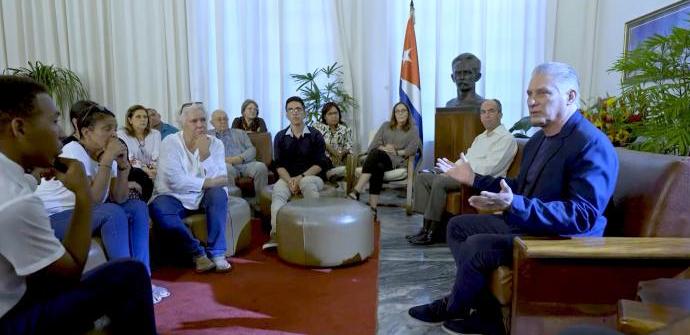
President Díaz-Canel engaging people from different sectors in
discussion of the Family Code prior to the referendum, September 20, 2022.
Another important area of the updated Family Code pertains to discrimination and violence within the family. It recognizes and protects the rights of vulnerable or potentially vulnerable members of families, typically children and adolescents, but also those who are victims of violence as well as older adults and people with disabilities. In the latter two cases, a section of the new Family Code is dedicated to their rights to autonomy and independence and the right to choose a place of residence in an accessible environment, and to participation and inclusion in family and social life in the fullest sense, with support that is respectful of their preferences.
A significant conceptual shift was made away from the old notion of parental authority to one of parental responsibility that calls for relations of fraternity, respect and consultation in parents' dealings with their children. It endorses principles such as gender equality and the obligation of parents to provide their children with emotional stability and to contribute to the free development of their personality based on their capacities, aptitudes and interests.
The new law acknowledges that expressions of family violence take different forms. It can be verbal, physical, psychological, moral, sexual, economic or patriarchal and be expressed through negligence and neglect and through action or omission, directly or indirectly. All matters of this nature are subject to urgent legal protection and anyone who considers themself to be a victim or has knowledge of violence being done to others, may request protection on a summary basis before the Municipal Court, regardless of whether there is criminal liability.
The new Family Code has now been published in the Official Gazette of the Republic of Cuba. Congratulations to the Cuban people and their leadership who united the people in the course of the deliberations on the new Family Code which enshrines a modern definition of rights. It puts to shame countries such as the United States which is fomenting a deadly civil war over matters pertaining to human rights such as have been enshrined in the Cuban Family Law. The law has been submitted for an informed vote in the true sense of the word. The cultural political life of the people has been enriched tremendously as a result. Through their deeds, Cuba and its people have shown once again what it means to have a democracy which vests decision-making power in the people. Viva Cuba!
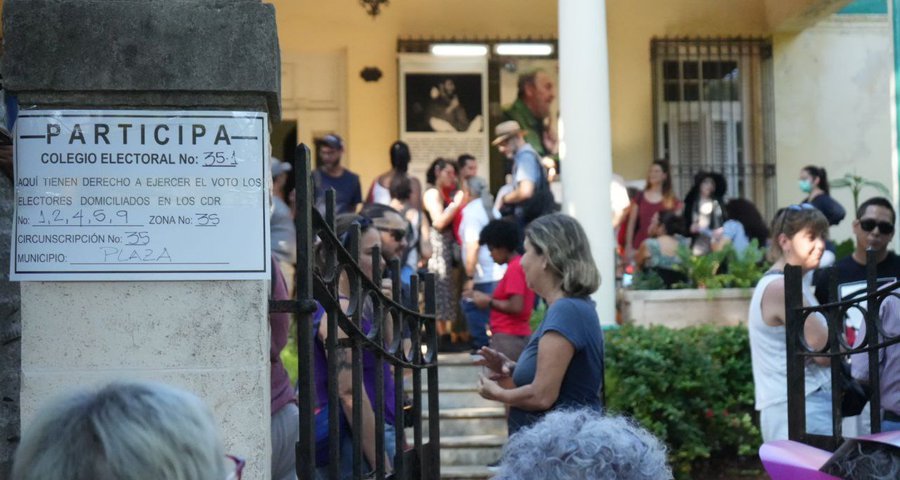
(With files from Granma, Cubadebate. Photos: Granma, Office of the Cuban President)
Trinidad and Tobago
46 Years of Republicanism: Constitution Matters
Perhaps it is fortuitous that the British Monarch passed away in the midst of our "Independence Season" August 31, Independence Day to September 24, Republic Day. Her death has come just as this former colony marks its 46th anniversary as a Republic.
The queen is continually referred to in all of the pageantry of her last rites and the formalization of the new monarch King Charles III as the sovereign. This suggests that the sovereignty of the United Kingdom and each of its realms as well as that of each of the former colonies which maintain the UK monarch as their Head of State also vest their sovereignty in the monarchy of the former imperial power.
The issue of sovereignty is a central issue in constitutional affairs for every country and people and between and among nations.
Our Independence Constitution of 1961 was made as an Order in Council of June 26, 1961 to come into effect "on a day to be appointed by the Governor."
The Governor, by section 1 of the Constitution, was to be "appointed by Her Majesty by Commission under Her Sign Manual and Signet and shall hold office during Her Majesty's pleasure" and "have such powers and duties as are conferred or imposed on him by or under this Constitution or any other law and such other powers as Her Majesty may from time to time be pleased to assign to him....according to such instructions, if any, as Her Majesty may from time to time see fit to give him."
Section 17 of the Order in Council stated, "Her Majesty reserves to Herself power, with the advice of Her Privy Council, to revoke, add to, suspend or amend this Order."
The British Monarch, therefore, remained not just the Head of State of this independent country but reserved the right to "revoke, add to, suspend or amend" the very Order to which its Constitution was an annex.
The sovereignty of Trinidad and Tobago remained vested in the British sovereign, their monarch.
It is no accident that the law to remove this monarch, Act No 4 of 1976, the Republican Constitution was passed in 1976 with a commencement date of August 1, 1976. By this Act, the sovereignty of this country was, we were told, vested in the Parliament on behalf of the people.
This concept was in keeping with the notion espoused by the 19th century English jurist John Austin, who, on investigating who exercises sovereignty in the name of the people or of the state, concluded that sovereignty is vested in a nation's parliament. A parliament, he argued, is a supreme organ that enacts laws binding upon everybody else but that is not itself bound by the laws and could change these laws at will.
Though the Republican Constitution was proclaimed on August 1, Republic Day is celebrated on September 24, the date on which the Parliament under the new Constitution first sat.
Our experience of the last 46 years gives us the opportunity to examine where, in fact, as opposed to British constitutional theory and legal definition, where the sovereignty of our country really lies and where it ought to.
Constitutional Changes Since 1976
Between 1976 and 2007, Parliament has passed 20 Acts amending the Republican Constitution.
These amendments have, in summary, had to do with:
i. Party matters and the Parliament with the introduction of the ‘crossing the floor' provision and the process of By-Elections to fill vacancies in the Lower House, created thereby or otherwise -- Acts 15 and 16 of 1978, and for removal of the Speaker of the House -- Act 17 of 1995.
ii. Amending the jurisdiction and powers of the Public Service Commission -- Act 8 of 1981, 13 of 1982, 177 of 1983, 21 of 1987, 8 of 1988, 10 of 1995, 43 of 2000, 82 of 2000.
iii. Amending the jurisdiction and powers of the Police Service Commission and the appointment of the Police Commissioner and Deputy Police Commissioners by final vote of the Lower House of Parliament -- Act 6 of 2006 and 12 of 2007 and a series of Orders of the President under those provisions since then.
iv. Requiring the Salaries Review Commission's Reports to be laid in Parliament -- Act 16 of 1978.
v. Providing for the filling of vacancies in the Judiciary -- Act 2 of 1988.
vi. Inserting the Tobago House of Assembly as part of the Constitution -- Act 39 of 1996.
vii. Introducing Joint Select Committees of Parliament to inquire into and report on Ministries, Municipal Corporations, Statutory Authorities, State Enterprises and Service Commissions -- Act 29 of 1999.
viii. Including the Tobago House of Assembly, Municipal Corporations, statutory boards and state enterprises and others under the jurisdiction of the Integrity Commission -- Act 81 of 2000.
ix. Including Senators, Judges and Magistrates under the jurisdiction of the Integrity Commission -- Act 89 of 2000.
For a table of constiutional amendments since 1976 click here.
Concentrating Power Rather Than Empowering the People
All the changes to the jurisdiction and powers of the Public Service Commission had to do with confirming the Prime Minister's power to veto senior appointments, extend the disciplinary powers of the Commission over public officers including those in acting positions and make criminal convictions automatic disciplinary breaches, and including employees of the Tobago House of Assembly (THA) and regional health authorities (RHAs, though RHA employees are not public officers).
Apart from the expansion of the jurisdiction of Joint Select Committees to have oversight roles over public bodies and constitutional bodies like Service Commissions, as well as the inclusion of the THA, all these other amendments to the Constitution since 1976 have either been to address party matters -- crossing the floor and allegations against a Speaker who was placed under House Arrest or to facilitate Government policies including privatization (RHAs) or more direct power of appointment of the top officers of the Police Service.
None of these amendments have had to do with improving the accountability of the elected or appointed members of Parliament or Ministers to those who elected them or to the public.
None of these amendments have increased the role of the people in decision-making which affects them or the society.
None of these amendments have resolved what President Richards at the 50th Anniversary of Independence, described as the ‘area of brokenness' in our Constitutional arrangements -- the issue of the relationship between Tobago and Trinidad and the right to self-determination of the people of both Trinidad and Tobago and ends the forced union and establishes a free and equal union between them.
The legislation relative to the work of the Integrity Commission has remained extremely weak in terms of enforcement or in deterring corruption or holding corrupt officeholders to account.
Vesting sovereignty in the Parliament has done little to ensure that the Parliament or Government (the Executive) acts in the interest of the People.
Proposals for further amendments in 2009 sought to further centralise power in the hands of the Head of Government while the Prime Minister continues to exercise even more powers in the absence of those changes.
The only proposal to give the electors some measure of control over the elected by establishing the Right of Recall to enable electors to hold their representatives accountable to them was unfortunately squandered in 2015.
This 46th Anniversary of our Republican Constitution is now perhaps the time for deep consideration to be given to vesting sovereignty truly in the people.
In this regard, and for the future of our nation, the Constitution and what we do with it matter.
Clyde Weatherhead, a citizen fighting for democratic renewal of the political and electoral processes of our governance arrangements.
(September 23, 2022)
(To access articles individually click on the black headline.)
Website: www.cpcml.ca Email: editor@cpcml.ca

